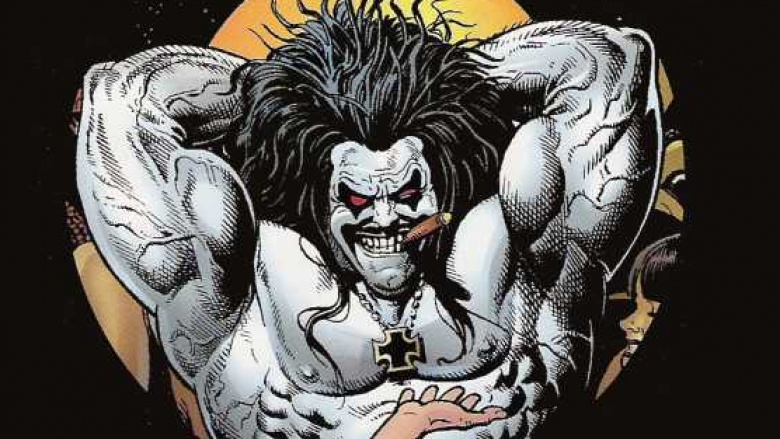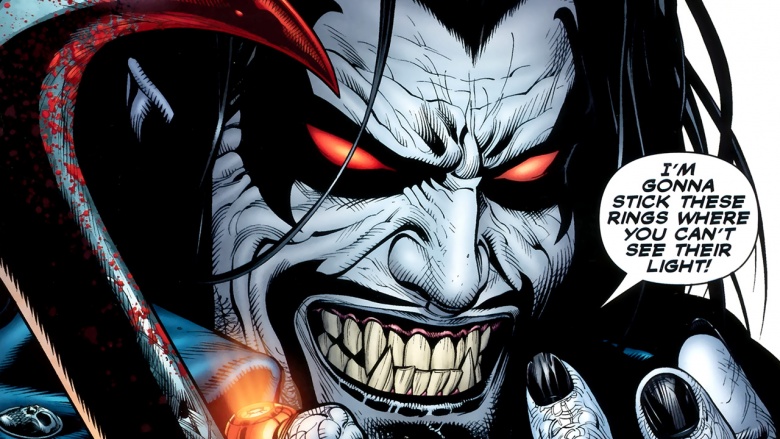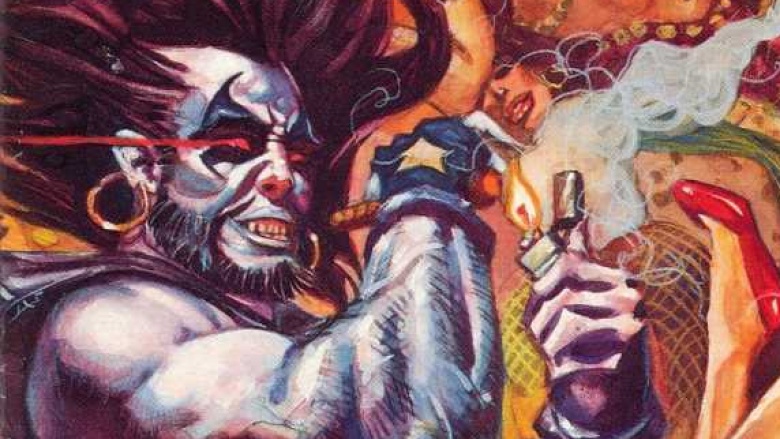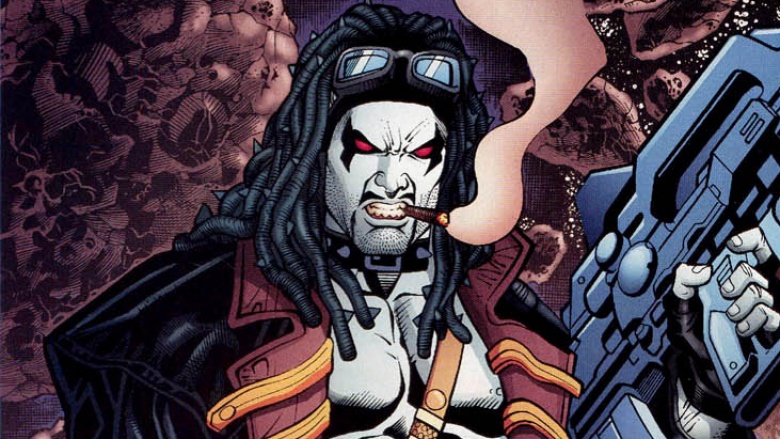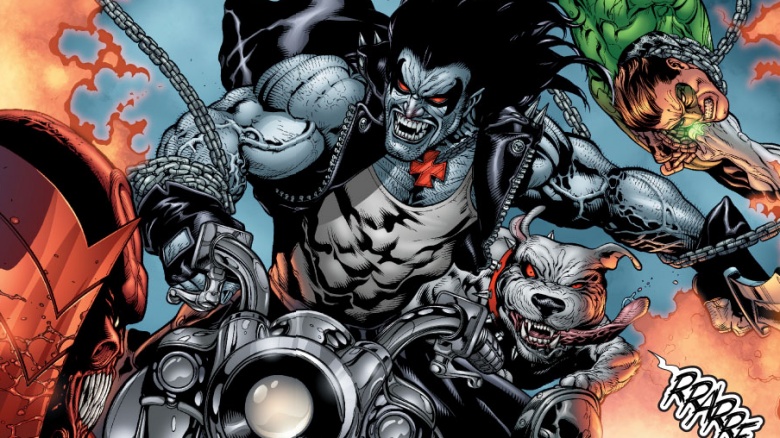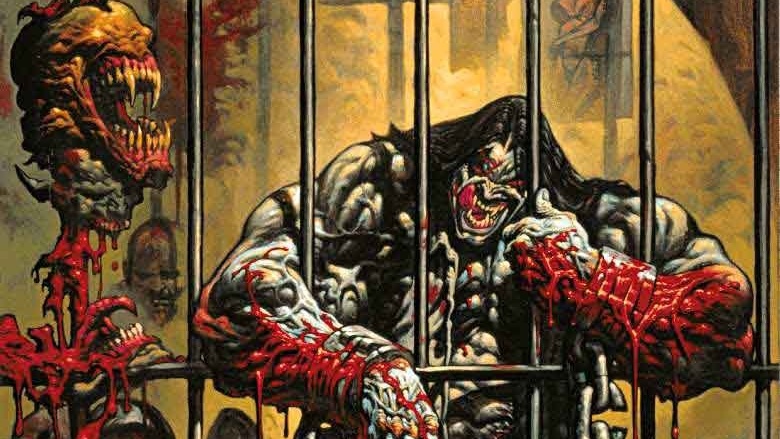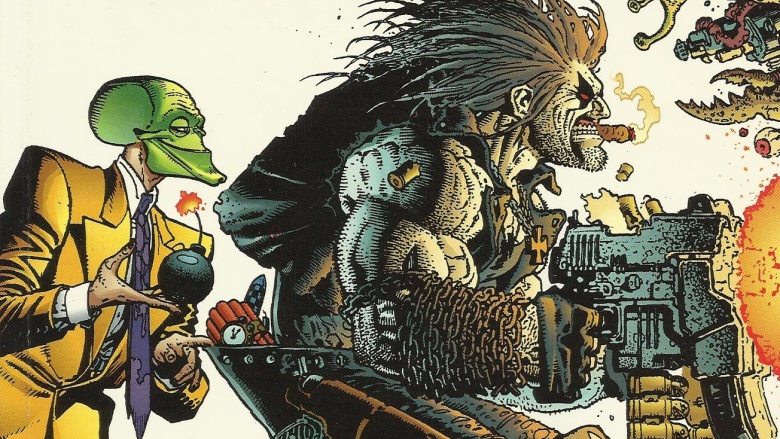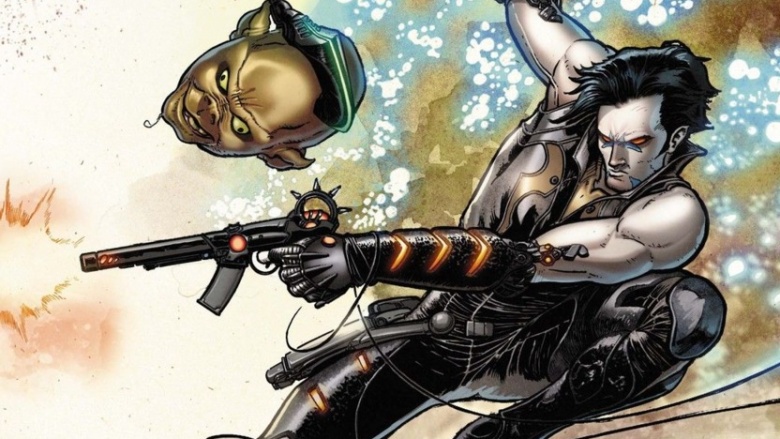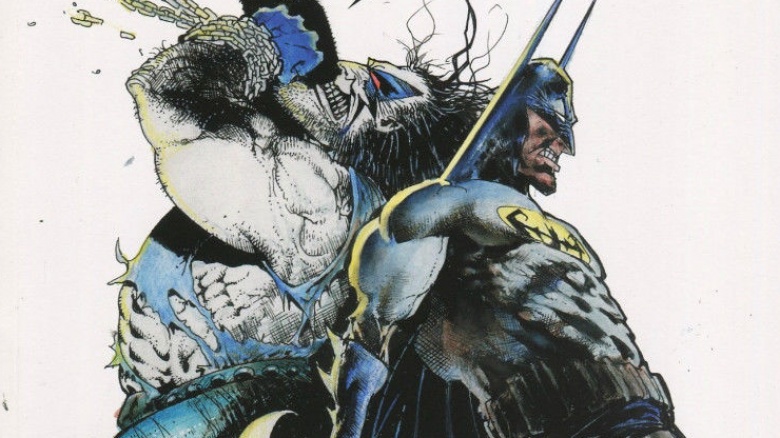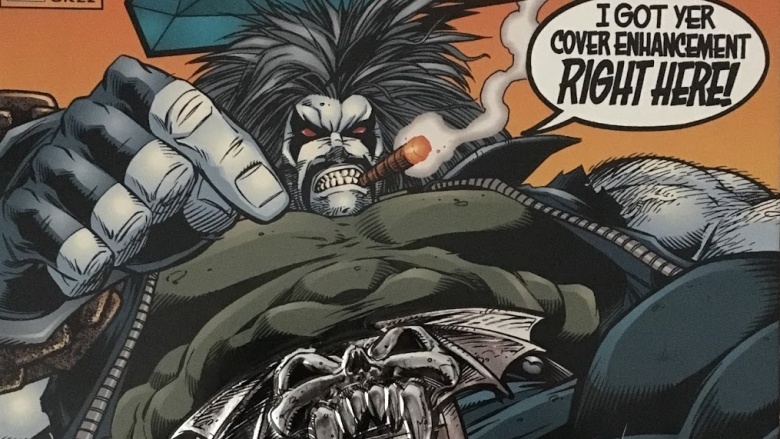Why DC Will Never Give Lobo His Own Movie
If you don't know Lobo, he's basically a mashup of Superman and Wolverine: an immortal, unkillable alien that happens to have super senses, a crazy healing factor, and a penchant for beer and cigars. Lobo's most ardent fans have waited years for The Main Man (as he calls himself) to make the jump to the silver screen. These hopes were further stoked when 20th Century Fox's vulgar, violent Deadpool ended up being a blockbuster smash at home and abroad. However, while Lobo has been able to escape actual Hell in the comics, his flick is never going to escape development hell. Here's why DC and Warner Bros. will never give Lobo his own movie.
Too redundant
The most fundamental problem with creating a Lobo movie is that Lobo is, at heart, a parody. The character was first illustrated by Keith Giffen. When Giffen was asked why the hell Lobo became so popular, he answered, "I have no idea why Lobo took off. I came up with him as an indictment of the Punisher, Wolverine, bad ass hero prototype and somehow he caught on as the high violence poster boy." For those too young to remember (and those who do remember simply drank the memories away), the '80s were a major period for the comic book antihero. In some cases, characterization went out the window in favor of berserker rages and goofy catch phrases, such as Wolverine being "the best there is at what he does."
Hence, Lobo became a parody of Wolverine in particular: an animalistic, ultra-violent character with super-senses and a snazzy healing factor. Sound familiar? Warner's big problem, however, is that because Hugh Jackman's Wolverine and Jon Bernthal's Punisher have become such iconic hits, an accurate adaptation of Lobo would come across as a cheap DC rip-off of Marvel characters because...well...it actually would be. The alternative is to completely change what made the character work, and that's pretty counterproductive for obvious reasons.
Too vulgar
The idea that Lobo couldn't work as a film because of the vulgarity may seem laughable in a post-Deadpool world. After all, that movie would seem to indicate that the world is ready for superhero movies filled with foul language and nudity—qualities that are Lobo's bread and butter. What's the problem, then? As some people are quick to forget, Deadpool may be a Marvel character, but his movie was produced by 20th Century Fox. He shares a universe with the X-Men who, very pointedly, do not share the cinematic universe of The Avengers.
This is important because both Marvel and Warner Bros. are intent on throwing a lot of money at major tentpole movies. Deadpool was made for a modest budget of $58 million, so its worldwide gross of over $782 million was quite impressive. Conversely, Suicide Squad has grossed over $745 million, but its budget was $175 million—and that's not counting the insane marketing for the movie. On paper, Suicide Squad and its cast of crazy killers would have been the perfect vehicle for R-rated hijinks of the vulgar and sexy nature, but Warner Bros., like Marvel, needs every "under 17" ticket it can sell. Think of it this way: MTV's short-lived Lobo cartoon portrayed nudity, drugs, and ample cussing, including telling the president, "F*** you." All of this was more vulgar than what we saw with Suicide Squad, making it unlikely that the Main Man will get a Warner Bros. movie anytime soon.
Too misogynistic
A surprising way that the DC Extended Universe has gotten ahead of Marvel's own cinematic universe is in the area of showcasing female heroes. While the MCU has shown us a badass Black Widow since Iron Man 2, she has yet to enjoy a solo outing. Like Hawkeye, she's been relegated to a supporting role, and this has combined with some uncomfortable moments that arguably chip away at her independence and power. Age of Ultron, for instance, reduces her to the Hulk's love interest and antidote (in a surprisingly literal "beauty and the beast" makeover). When she's not fulfilling that role, she laments that her super-spy background has left her unable to have kids.
In short, she's becoming more identified by her femininity rather than her agency, and it seems we'll get more movies and sequels about obscure characters before she gets her own movie. Warner Bros., however, rushed to introduce us to Wonder Woman and to bring her solo movie into development.
So why would Lobo upset this? Well, he's a character largely defined by his sexism and misogyny: in one notable comic, he ripped Starfire's top off against her will as "payment" for his help. In his backstory, he napalmed his kindergarten teacher to death with a bomb because she criticized him. It's difficult to imagine that level of casual sexism and violence towards women to stand alongside the feminist icon that is Wonder Woman; if nothing else, Lobo is a PR nightmare waiting to happen.
That whole genocide thing
In most superhero stories, the hero is partially defined by their tragedy. That is, losing important people—be it Batman losing his parents or Superman losing his entire race and planet—is presented as an event that shapes their entire moral compass and charts their course towards eventually putting on a cape. Lobo is literally the complete opposite: like Superman, he's the last of his race (more or less). Unlike Superman, he did not lose his home planet of Czarnia due to unforeseen crisis. Instead, he unleashed a plague that killed his entire planet.
The Main Man describes it pretty well in the animated Superman series, telling the hero that "I'm the last Czarnian. I fragged the rest of the planet for my high school science project. Gave myself an A." This kind of wholesale slaughter (and utter lack of regret) is probably a major "no go" for Warner Bros. or its audience. For instance, while we may cheer watching Deadpool slice and dice henchman, the movie goes out of its way to emphasize that these are bad people who contributed to a mutant trafficking ring. Killing an entire planet, however, is a moral event horizon that audiences are not yet ready to cross with Lobo just yet. Think about it—destroying an entire world for your own selfish reasons is actually the background for Darkseid, the main Justice League villain. It'd be tough to ask audiences to turn around and root for someone with a similar backstory.
Animal cruelty
One of Lobo's odder characteristics was his pet bulldog that was named, with great originality, Dawg. This was a white bulldog that accompanied Lobo on his various misadventures. If you squinted from a distance, it would be easy to draw a comparison to Krypto, Superman's own alien superpooch that helped him on his wacky adventures. However, the similarities end there: Dawg's relationship with Lobo is terminated when the violent alien simply stomps the animal to death in front of Superman, seemingly as a way of proving that the bulldog does not belong to him.
This kind of capricious cruelty is why Lobo can't be brought to the big screen in all of his violent glory. While Lobo isn't cruel to all animals (he has a bizarre affinity for space dolphins), he violently murders anyone that gets in his way. Even if Warner Bros. was committed to bringing that kind of vision to life, it's tough to imagine moviegoers having the stomach for it. Batman v Superman was criticized for its gun-wielding and murderous Batman, and many cited the title bout between the two powerhouses as a joyless slugfest. That critical outcry has led to the confirmation of a lighter cinematic universe going forward, meaning that Lobo will have to fight off PETA without the help of the silver screen Justice League.
No chemistry
You can blame this one pretty squarely on Zack Snyder. Part of Lobo's enduring charm in his different appearances has been that he serves as such a pointed contrast to characters like Superman and Batman. He's someone who'll kill people without a thought just for annoying him, and who ruthlessly follows his own bizarre code of honor. In the comics, this means he inevitably butts heads with heroes who are dedicated to the preservation of all life.
In the DC Extended Universe, though, we see a Batman and Superman that actually already share some of Lobo's qualities...aside from his sense of humor, that is. According to Mr. Sunday Movies, Batman kills a total of 21 people in Batman v Superman, and Superman's complicity in the destruction of Metropolis—killing thousands, if not millions, of people during the final act of Man of Steel—is a major plot point of Batman v Superman. Honestly, if the comic book Lobo were dropped into that universe and began killing anyone who got in his way, he would look like a rehash of the heroes we've had before. Throw in the general dearth of humor in the DC Extended Universe and there's no real place for Lobo. We're stuck with the humorless mass-murdering superheroes instead, making our favorite Czarnian a bit redundant.
Religious objections
For better or for worse, the DC Extended Universe has not shied away from using religion to tell its stories. This has ranged from the uncomfortable Superman parallels to Jesus in Man of Steel to Lex Luthor's rants about gods and monsters in Batman v Superman. However, it's apparent that religion is valued in this universe: Superman takes comfort from the words of priests, and the audience is ultimately meant to take comfort from those Christian parallels.
What's this got to do with Lobo? Historically, Lobo has been a sacrilegious figure. The character has literally been banned from both Heaven and Hell, especially after his soul rampaged through Hell destroying those who opposed him (and if you're wondering where the residents of hell go when they die again, well, we get no real answer on that front). In another weird storyline, he serves as the pope to the Church of the Triple-Fish God (doubly ironic after that time he impersonated a priest). Lobo, of course, finds a way to kill that god and escape the restrictive vows he took. This character is squarely at odds with our previously established role of heroes and religion in the DC Extended Universe: in fact, an accurate Lobo movie would actually prove ranting Lex Luthor right, with an all-powerful and merciless god descending from the heavens and using humanity as his playthings.
Inconsistent power level
One of the basic rules of storytelling is that characters must somehow be vulnerable. This helps them face various crises and grow over the course of a story so that they are not the same on the other side of the tale. When superheroes have no apparent vulnerabilities, you have to introduce something. That's one of the reasons that Kryptonite was eventually brought in to Superman's stories: to bring him down to Earth.
Lobo's powers have been inconsistent and would be a nightmare to translate to the silver screen. He is literally unkillable and immortal, surviving everything from the vacuum of space to the fires of Hell. Lobo possesses a healing factor more powerful than Wolverine's, and he can effortlessly go toe-to-toe with Superman in a fight. In a very pointed parody of a weird Wolverine story, Lobo even gained the ability to make clones of himself from a single drop of blood. How out of control are his powers? It's actually part of the Lobo canon that he is just going to keep developing new powers over time. So, to recap: he's as strong as Superman, can spawn an army of himself from some blood, and can never die, and there's no Kryptonite equivalent for Lobo (unless you count running out of booze). Imagine how much more damage Zod and Superman's fight would have caused if it was impossible to snap Zod's neck. That'll give you a good idea of why Lobo will not work on the big screen.
Design throwback
Lobo faces a unique problem when it comes to modern appearances. The character was introduced in the 1980s and has historically looked the same: a leather-clad space biker. On Lobo's best day, he looks like an extra from the original Mad Max movies, which can be problematic for a DC Extended Universe that tries to update the look of its heroes and villains. The different iconic Lobo hairstyles would be difficult to pull off as well: he has shared the same mullet that haunted '90s Superman, and he's also pulled off the same "white dude with dreadlocks" that your old roommate liked to do...and just like with your roommate, you can't quite figure out if this is ugly cultural appropriation or just plain old ugly.
So, why not change his look entirely? The short answer is that Lobo fans would riot. We know this because it's already happened: when DC comics was busy reinventing its heroes with visual and narrative makeovers in the "New 52" event, Lobo got what amounted to a more realistic makeover. The character running around as Lobo was portrayed as a thin, white-skinned guy with modest hair and simple, dark clothing. Did he look like a generic genre character? Yup. The outcry against this redesign was intense, with many petitions, angry letters, and really angry internet comments from Lobo's fans. For Warner Bros., this is a true "damned if you do, damned if you don't" moment: they could try to fit the over-the-top throwback of a character into their super-serious and realistic cinematic universe—which would be a terrible fit—or they can drastically change his appearance and attitude, which has already ended disastrously in the world of comics.
Why so serious?
The final reason why Lobo will never see a silver screen appearance is that the Snyder-led DC Extended Universe has been established as a grim and gritty place. Think of it this way: fans of these movies were overjoyed to hear the Flash crack a joke in a sneak peak for the Justice League movie. That's how starved for humor these fans are, as even one joke in a sizzle reel for a movie a year away comes as a breath of fresh air. Lobo is a character established firmly in parody and associated almost entirely with humor and violence, often both at the same time. Case in point: the time that Lobo was hired by a drunken Easter Bunny to go murder Santa Claus. In case you're wondering how that story ended, Lobo decapitated Santa Claus and then bombed the naughty and nice with H-bombs from Santa's sleigh. There is, sad to say, no room in the gritty realism of that cinematic universe for the man who would murder Santa Claus. Take heart, though: we can still cheer on our new, murderous Batman!
Final Fraggin' Thoughts
There's just no way in hell that the genocidal, sacrilegious, misogynistic bastich Lobo will see the light of day as a DC Extended Universe character. However, that's no reason for Lobo fans to be sad, as the character isn't going anywhere. As controversial as DC's re-design was, it shows a commitment to keeping the character modern and relevant. He's likely to continue popping up in more of DC's wonderful animated movies, and fans are hoping he'll be playable in the sequel to the fighting game Injustice: Gods Among Us. And with more shakeups coming in the wake of DC's rebirth event, it seems likelier than ever that fans will soon have more of the Main Man than they can handle.There's no time like the present to introduce your friends and family to this utterly bizarre character: just ask them if they have heard the good news about the Triple Fish God to get your foot in the door!

